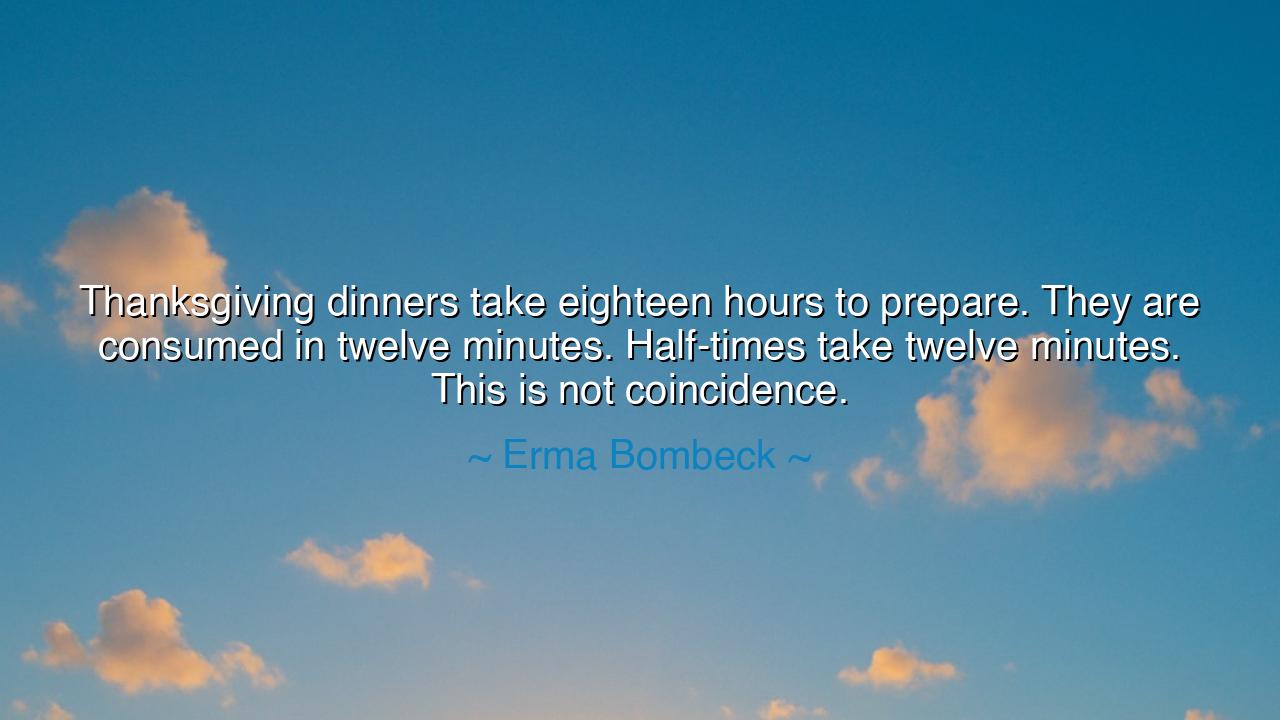
Thanksgiving dinners take eighteen hours to prepare. They are
Thanksgiving dinners take eighteen hours to prepare. They are consumed in twelve minutes. Half-times take twelve minutes. This is not coincidence.






"Thanksgiving dinners take eighteen hours to prepare. They are consumed in twelve minutes. Half-times take twelve minutes. This is not coincidence." With this humorous yet piercing observation, Erma Bombeck reveals the paradox of Thanksgiving: a day of immense labor and sacred ritual, culminating in a fleeting moment of feasting that vanishes almost as soon as it begins. Her wit does not belittle the holiday, but rather illuminates the truth that the meaning of gratitude is not found only in the eating, but in the labor, the gathering, and the shared rhythm of tradition.
The origin of this thought lies in the modern blending of two great American traditions: the elaborate feast and the ritual of football. The holiday has long been shaped by both. The hours upon hours of peeling, basting, seasoning, and baking reflect the love and devotion poured into preparing a table that brings family together. Yet the quickness with which the meal is consumed, aligned almost exactly with the halftime of a football game, reminds us that the feast is but one act in a larger performance of belonging. Bombeck sees a strange poetry here: that the brevity of the meal and the structure of sport are woven into one shared cultural script.
History teaches us that this pattern is not unique to our time. In medieval Europe, great banquets took days to prepare, involving entire households of servants, cooks, and hunters. Yet once the food was placed upon the tables, nobles and guests devoured it in what often seemed like a blink. The true richness of the feast was not in the minutes of eating, but in the preparation, the gathering, the music, and the company. Just so, Thanksgiving is not diminished by its brevity at the table, for its true value is in the unseen hours of labor, the traditions handed down, and the shared laughter before and after the meal.
The brevity of the feast also carries a deeper spiritual lesson: that life itself is often like Thanksgiving dinner. We labor long, we prepare carefully, we invest love and energy, only to find that the moments of joy seem fleeting. The meal is gone, the laughter fades, and what remains are memories. Bombeck’s humor draws us to this truth, urging us not to mourn the swiftness of joy, but to treasure it. For it is not the length of the meal that matters, but the love that filled it.
And yet, there is irony in her remark about halftime. She hints that perhaps we have so perfectly synchronized our lives that even our rituals of family and gratitude are bound to the schedule of entertainment. What she exposes, with humor, is the human tendency to balance sacred and secular, to blend food and sport, prayer and play. Rather than lament this, she marvels at the symmetry, showing us that the rhythms of culture are never accidental—they are mirrors of who we are.
The lesson for future generations is this: do not measure the value of a feast by the minutes spent consuming it. Remember that the labor of preparation, the laughter in the kitchen, the table set with care, and even the brevity of the meal are all part of a sacred rhythm. Joy is not less precious because it is brief—it is more so. In truth, the fleeting nature of the feast teaches us gratitude more than abundance ever could.
Practical action flows from this wisdom. When you prepare a holiday meal, do not despair at how quickly it will vanish. Instead, savor each stage: the preparation, the anticipation, the gathering, the sharing. Let the fleeting nature of the meal remind you to cherish the moment rather than cling to it. And when the meal ends and the game resumes, do not sigh that it was short—rejoice that it was real, and that you were present for it.
Thus, Bombeck’s words, though playful, rise to the level of timeless teaching: life’s greatest joys are fleeting, but their brevity makes them sacred. The feast, the laughter, the halftime, and the memory are not coincidences—they are threads in the same tapestry. To honor them is to learn gratitude not only for what lasts, but for what passes quickly and leaves the heart full.






AAdministratorAdministrator
Welcome, honored guests. Please leave a comment, we will respond soon